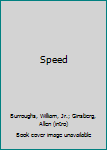Speed
Select Format
Select Condition 
Book Overview
No Synopsis Available.
Format:Mass Market Paperback
ISBN:B000P3TE1I
Release Date:January 1970
Publisher:The Olympia Press
Weight:0.50 lbs.
Customer Reviews
3 ratings
The One That Fell Through The Cracks
Published by Thriftbooks.com User , 21 years ago
William Burroughs Jnr. was born to the predicament that all those in the wake of a formidable family history are. That is, one in which one must, to forge one's own identity, risk especially large strides to step from long familial shadows. Burroughs Jnr.'s ancestors cast not only long shadows, but contorted ones too. His great grandfather founded the Burroughs Adding Machine Company, the double-edged sword of inheritance then laid at the feet of subsequent generations; at age four his father, iconic hophead and avant-garde litterateur William S. Burroughs, accidentally shot his mother in the head during a drunken presentation of William Tell. (She died. Burroughs Snr. was charged with criminal imprudence and subsequently decamped for South America and Tangiers, the latter being where he wrote NAKED LUNCH, a love-it-or-hate-it binge of surreal imagery that has since assumed mythic proportion in counterculture lore.) By age eighteen he was under the care of his paternal grandparents in West Palm Beach, Florida - and injecting methamphetamine daily. It is here that we rendezvous with the narrative of SPEED. Superficially the book recounts the 1966 trip to New York made by Burroughs Jnr. and his needle buddy, Chad ("His whole attitude was full of fear and I could see that right off, and I always respect scared people who know what they're up against.") Chad comes off as one or two shy of the full compliment ("We turned a corner and he kept on going straight and didn't answer when I called to him.") though as a sidekick I think he would have been without peer. Appropriately he provides the book's comic highlight, a bout of grand paranoia during which he makes the protestation familiar to anyone acquainted with that state of being: "Every direction I started to go, he'd say, `Oh, no! You're not getting me to go THAT way!'"Accompanied only by their wits and an accommodating moral code ("I never rob anyone unless they die or go to jail which leaves me plenty of room, after all. I remember one time I boosted a guy that was only in a coma, and when he came to, the atmosphere was pretty strained for a while.") they accept hospitality where they can, occasionally with squares ("They wondered in stage whispers what was on my mind. I said, `Carnivorous albino badgers, the size of a boxcar,' and they shut up.") but mostly with fellow chemical crusaders, amiable folk who wished the trivial and mundane would let them be so that they could get down to the real business of transcending reality ("I got on the phone to another session across town and tried to get them to come over. But they were all in the midst of God and didn't feel like driving.")Considering what must have been a fairly skewed appreciation of reality, his sensibilities nevertheless appear attuned to some degree. At a gas station he lingers to savour the phonetics of "Gargoyle Arctic Oil", and later falls to the spell of a prodigal jazz musician ("But one morning I woke up just as it was getting p
Work of art on it's own merit....
Published by Thriftbooks.com User , 23 years ago
READ THIS FOR YER OWN GOOD...
fine book, damn' fine book
Published by Thriftbooks.com User , 27 years ago
_Speed_ was William S. Burrough's Jr.'s (not to be confused with his father, the "real" WSB) first novel. It's hard not to compare it to _The Basketball Diaries_ on the basis of some trivial and obvious similarities (_Speed_ is about the author's adolescent experiences as a methedrine addict in NYC) but he's going somewhere very different from where Carroll was going. His vision is colder and more distant than Carroll's, less sentimental. Yes, it IS possible to be less sentimental than Jim Carroll. WSB doesn't (didn't, i should say) write at all like his father; his prose is clean and spare, his characters are human, etc. Forget WSB sr. and Jim Carroll; WSB Jr. was enough of a writer to be considered on his own merits, which are significant. A very worthwhile book, as is its sucessor, _Kentucky Ham_. A third novel, _Pakriti Junction_, apparently was too fragmentary to print at the time of the author's death.






